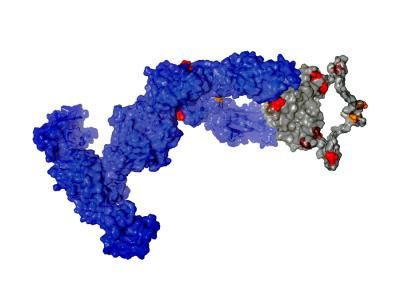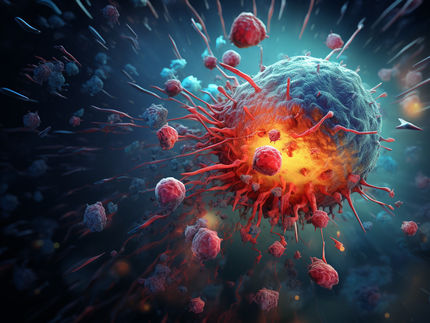Learning from sharks
Custom-tailored antibodies are regarded as promising weapons against a multitude of serious illnesses. Since they can accurately recognize specific structures on the surface of viruses, bacteria or cancer cells, they are already being deployed successfully in cancer diagnostics and therapy, as well as against numerous other diseases. The stability of the sensitive antibodies is a decisive factor in every step, from production and storage to therapeutic application.

Janosch Hennig, TUM/Helmholtz Zentrum
A team of researchers headed by Dr. Matthias J. Feige and the professors Linda Hendershot of St. Jude Children's Research Hospital in Memphis (Tennessee, USA), Michael Sattler (Chair of Bimolecular NMR Spectroscopy at TU Muenchen and the Institute for Structural Biology at the Helmholtz Zentrum Muenchen), Michael Groll (Chair of Biochemistry at TU Muenchen) and Johannes Buchner (Chair of Biotechnology at TU Muenchen) set out to find new approaches for stabilizing antibodies by comparing mammalian antibodies with those of sharks.
Sharks have been in existence for over 500 million years. From an evolutionary perspective they are among the oldest animals with a "modern" immune system not unlike that of humans. Shark blood contains large quantities of urea, allowing the animal to survive in salt water. While urea protects sharks from dehydration, it can also destabilize sensitive protein molecules such as antibodies.
"Human antibodies would collapse under these conditions. Shark antibodies must, therefore, possess structural characteristics that make them particularly robust," says Matthias J. Feige, lead author of the publication. "We wanted to unravel this mystery."
Meticulous puzzle work
The researchers chose the IgNAR (immunoglobulin new antigen receptor) shark antibody for their investigations. Lacking structural information on the molecule and due to the fact that the molecule could not be completely crystallized, they developed a model of the antibody in detective-like puzzle work.
They crystallized parts of the antibody and determined their atomic structures using X-ray crystallography, comparing the segments with previously known structures of other immunoglobulins. For other antibody segments, they analyzed the structures using NMR spectroscopy. Time and again the researchers compared the determined structures and spatial distances with the results of X-ray diffraction measurements of natural shark antibody molecules to then finally construct a comprehensive model of the IgNAR antibody.
Precise examination of the protein's structure revealed that the Ig folding typical for antibodies had already developed over 500 million years ago, since it is also present in sharks. Moreover, the researchers were able to identify the source of the of shark antibody stability: It results from an additional salt bridge between structurally important amino acid chains and a particularly large non-polar nucleus of the Ig fold in shark antibodies.
Human antibodies with enhanced stability
The researchers succeeded in integrating both stabilizing principles into human antibodies. In fact, the combination of both principles led to a significant increase of stability of the human antibody fragments. Their melting point was 10 degrees higher than that of the original molecule.
The increased stability also showed a positive effect in mammalian cells that typically produce therapeutic antibodies: The altered antibodies were produced in significantly larger quantities. In the near future, so the expectation of the researchers, this insight will enable the development of improved therapeutic and diagnostic antibodies. They should become easier to fabricate and store, as well as remain active longer inside the human organism, allowing them to unfurl their full therapeutic potential.
Original publication
Matthias J. Feige, Melissa A. Graewert, Moritz Marcinowski, Janosch Hennig, Julia Behnke, David Ausländerb, Eva M. Herold, et al.; "The structural analysis of shark IgNAR antibodies reveals evolutionary principles of immunoglobulins"; PNAS.
Other news from the department science
Most read news
More news from our other portals
See the theme worlds for related content
Topic world Antibodies
Antibodies are specialized molecules of our immune system that can specifically recognize and neutralize pathogens or foreign substances. Antibody research in biotech and pharma has recognized this natural defense potential and is working intensively to make it therapeutically useful. From monoclonal antibodies used against cancer or autoimmune diseases to antibody-drug conjugates that specifically transport drugs to disease cells - the possibilities are enormous

Topic world Antibodies
Antibodies are specialized molecules of our immune system that can specifically recognize and neutralize pathogens or foreign substances. Antibody research in biotech and pharma has recognized this natural defense potential and is working intensively to make it therapeutically useful. From monoclonal antibodies used against cancer or autoimmune diseases to antibody-drug conjugates that specifically transport drugs to disease cells - the possibilities are enormous



















































